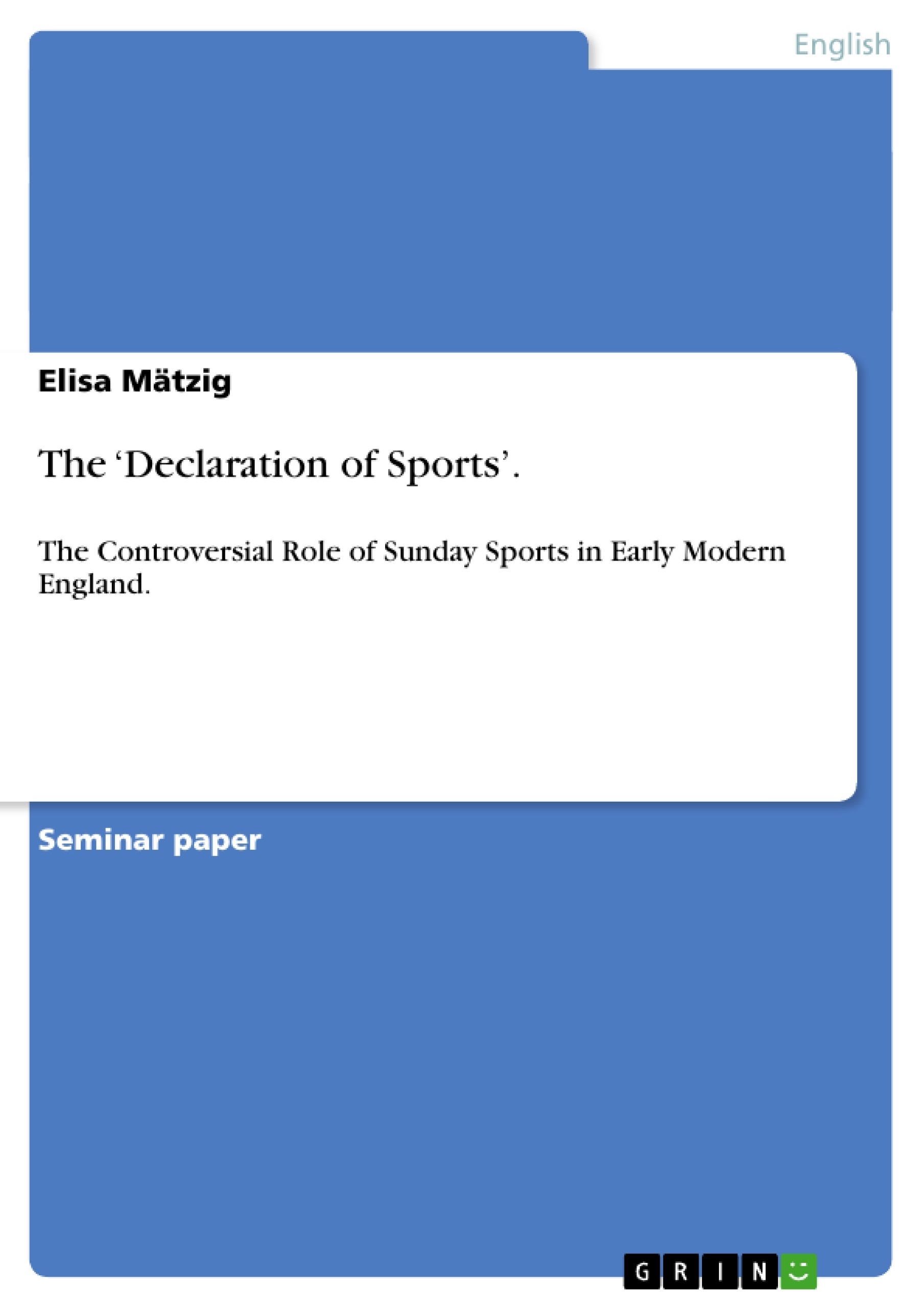The reigns of James I and Charles I were accompanied by great upheavals within the English society, the Anglican Church and the entire European balance of power. There were issues concerning marriage, foreign wars and religion. In so far the period does not vary so much from the reigns of other English monarchs. However, both kings had to deal with an issue that seemed to become stronger and stronger in the course of their power: the growing Puritan influence in the country and the resulting grievance and dissatisfaction within the English people. One of the characteristic features of the Puritan movement was an insistence on a strict keeping of the Christian Sabbath on Sundays. Of all the reformed movements on the Continent, none ever came anywhere close to the Puritans' extreme Sabbatarianism. It had long been a custom in England that Sunday mornings were dedicated to Christian worship, and were then followed by sports and games on Sunday afternoons. Sports always had an extraordinary importance in the lives of the English people. Already in the medieval time, around 1190, there are documents to be found stating that there had been a real enthusiasm about sports in England. Amongst these sportive activities were: jumping, archery, wrestling, throwing stones and fencing but also the annual rowing regatta on the river Thames.
The Puritans loudly objected to the practice of Sunday sports, believing that playing games on the Sabbath constituted a violation of the Fourth Commandment. In the early seventeenth century, Puritans came to dominate several localities and managed to succeed in banning Sunday sports. In 1617, in Lancashire, there was a particularly intense quarrel between the Puritans and the local gentry over the issue of Sunday sports. In response to the controversy raging in his diocese, Thomas Morton, Bishop of Chester, asked the king for a ruling on the propriety of Sunday sports. In response to Bishop Morton's request, King James issued the ‘Declaration of Sports’, a declaration claiming that it was lawful to play some sports on Sundays, but not others. Of course, the document was very controversial among the Puritans. The king commanded all Anglican ministers to read the ‘Declaration of Sports’ to their congregations.
Inhaltsverzeichnis (Table of Contents)
- INTRODUCTION
- EARLY MODERN ENGLISH HISTORY IN THE TIMES OF JAMES I AND CHARLES I: AN OVERVIEW
- JAMES I (SCOTLAND, 1537-1625; ENGLAND, 1603-1625)
- CHARLES I (1625-1649)
- THE PURITAN MOVEMENT
- THE 'DECLARATION OF SPORTS'
- CONTENT OF THE DOCUMENT
- BACKGROUND OF THE 'DECLARATION OF SPORTS'
- CONCLUSION
Zielsetzung und Themenschwerpunkte (Objectives and Key Themes)
This paper explores the 'Declaration of Sports', its significance in the context of Early Modern England, and its underlying intentions. It examines the political climate of the era and the rising Puritan influence, which led to the controversy surrounding the 'Declaration of Sports'. The document itself is analyzed, focusing on its content and the background that shaped its issuance. Key themes include: * The historical context of the reigns of James I and Charles I * The Puritan movement in England and its opposition to Sunday sports * The content and background of the 'Declaration of Sports' * The meaning of Sunday within the Puritan movement * The specific role of Lancashire in the controversyZusammenfassung der Kapitel (Chapter Summaries)
- Introduction: This chapter sets the scene for the 'Declaration of Sports', outlining the tumultuous political and religious environment of Early Modern England under the reigns of James I and Charles I. It highlights the growing Puritan influence and their strong opposition to Sunday sports, setting the stage for the subsequent discussion of the 'Declaration of Sports'.
- Early Modern English History in the Times of James I and Charles I: An Overview: This chapter provides a general overview of the historical context, focusing on the reigns of James I and Charles I. It describes the state of England after Elizabeth I's reign, emphasizing the economic prosperity and the growing influence of the Puritan movement.
- James I (Scotland, 1537-1625; England, 1603-1625): This chapter delves into the early life of James I, his education, and his rise to power. It discusses his concept of kingship and his approach to governing both Scotland and England.
- Charles I (1625-1649): This chapter examines the reign of Charles I, exploring his relationship with the Puritan movement and the continued conflict over Sunday sports. It sets the stage for the reissuance of the 'Declaration of Sports' under Charles I.
- The Puritan Movement: This chapter focuses on the Puritan movement in England, exploring its beliefs, motivations, and practices. It specifically examines the Puritan stance on Sabbath observance and their strong objection to Sunday sports.
- The 'Declaration of Sports': This chapter delves into the 'Declaration of Sports' itself, examining its content and its stated purpose. It explores the king's justification for allowing certain sports on Sundays while prohibiting others.
- Content of the Document: This chapter provides a detailed analysis of the content of the 'Declaration of Sports', exploring its specific regulations concerning permissible and prohibited activities on Sundays.
- Background of the 'Declaration of Sports': This chapter explores the context surrounding the 'Declaration of Sports', examining the specific circumstances that led to its issuance. It focuses on the role of Lancashire and the ongoing conflict between the Puritans and the local gentry over Sunday sports.
Schlüsselwörter (Keywords)
This paper primarily focuses on the 'Declaration of Sports', a document that reflects the complex social and religious tensions in Early Modern England. Key concepts include the historical period of Early Modern England, the reigns of James I and Charles I, the Puritan movement, Sunday observance, the role of sports, the 'Declaration of Sports', and the controversy surrounding its issuance. The document itself provides a unique insight into the tensions surrounding the role of religion, leisure, and social control in seventeenth-century England.- Citar trabajo
- Elisa Mätzig (Autor), 2008, The ‘Declaration of Sports’. , Múnich, GRIN Verlag, https://www.grin.com/document/139014



